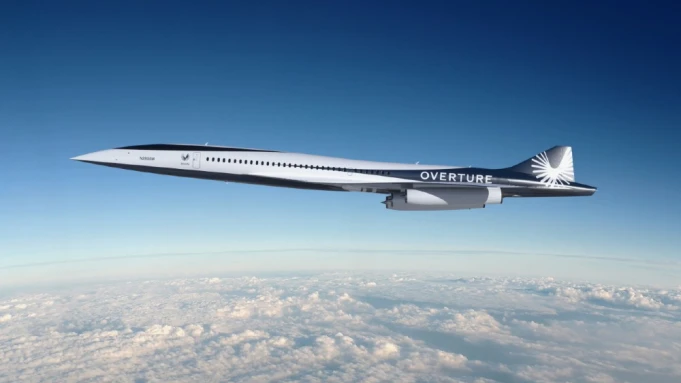Supersonic air travel has always messed with the concept of time. Such as being able to fly across the Atlantic and land before your scheduled departure time.
But planemaker Boom managed to reach new heights of temporal irony with the latest iteration of its Overture supersonic aircraft. Its production-conforming design revealed recently at the Farnborough Air Show in the UK has managed to turn the clock back to the 1960s and look astonishingly similar to Concorde. Huge delta wings, four underslung engines and a long, slim fuselage make a comparison hard to avoid.
But given the six decades of technological innovation since French and British designers penned the world’s first supersonic airliner, Boom has been able to bring in some improvements. Its composite Overture has a conventional tail, its wing has a sinuous twist and the medium-bypass turbofan engines do away with the need for afterburners—which were responsible for a substantial part of the noise levels that helped kill off Concorde.

The Overture is scheduled for first flights in 2026. Courtesy Boom Supersonic
Avoiding afterburners pays dividends in fuel consumption, too. Boom is also making a separate nod towards sustainability by vowing that its engines will run on 100 percent sustainable aviation fuel (SAF).
The Overture will have a Mach 1.7 cruise speed over water, a cruising altitude of 60,000 feet, a non-stop range of 4250 nautical miles, and a capacity of up to 80 speed-enthused passengers.
 Courtesy Boom Supersonic
Courtesy Boom Supersonic
The company says the Overture will cut flight times from New York to London by two hours.
Boom is also promising wow factors along with the technology, at least for aviation nerds. The fuselage is optimized for aerodynamic efficiency by being slightly larger in cross-section at the front than at the back. The door where the passengers board is in this larger section, which will give a roomy feeling to the start of people’s super-speed experiences. Anyone who remembers Concorde will recall a narrow, low-headroom pencil of an airplane that was fabulous because it was fast, not because it was luxurious or comfortable. The windows are much bigger than Concorde’s, too.
While Boom has ruled out a full combat version, it has partnered with Northrop Grumman to market a variant to military forces and governments for fast transport and logistics. Given that the Mach 1 over-land speed limit is determined by regulations rather than physical capability, military command might find it useful to have a means of transporting personnel and equipment that can double the speed of conventional jets at red-emergency times.
The long, narrow body, delta wings and four under-wing engines resemble Concorde, but that’s where the similarities end.
Boom said the first flight of its production-spec aircraft is scheduled for 2026. Boom already has 70 orders, with options from carriers like United and Japan Airlines. By contrast, only 26 examples of Concorde were ever built, and just 14 entered service.
Will the Overture succeed where Concorde, and another more recent supersonic builder, Aerion, failed? Maybe. A combination of radically shorter flight times—New York to London in 3.5 hours as opposed to 5.5 now, and Tokyo to Seattle in 4.40 against 8.30—and carbon-neutral operations could allow Boom’s Overture to finally harness supersonic’s commercial potential, whereas Concorde only gave a tantalizing glimpse of the future.
























